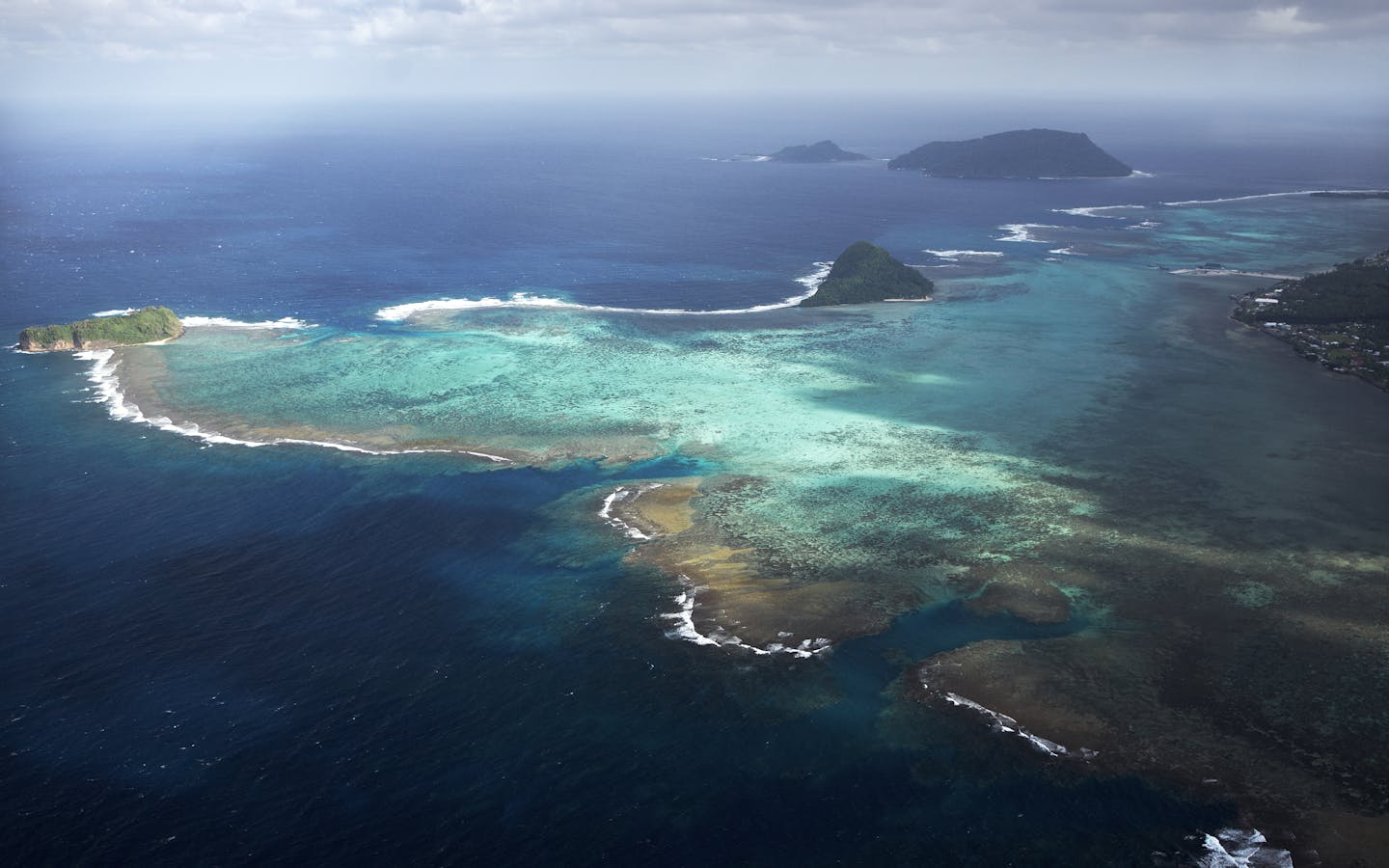At Conservation International, we don’t focus on one sector or one issue, and we’re not interested in short-term fixes. Instead, building upon a foundation of science, partnership and fieldwork, we find global solutions to global problems.
At sea
Subsistence fishing is the largest and most important fishing activity in Samoa. Over 40% of village households have at least one fisherman by trade. The total estimated annual catch is 13,686 tonnes, valued at USD 34 million, and the average annual consumption is 57 kg per capita*.
In Samoa, our focus is on increasing economic opportunities and human well-being while sustainably managing critical ocean resources. We work in collaboration with the Samoan Ministry of Natural Resources and Environment, Ministry of Agriculture and Fisheries and other key stakeholders to share lessons, tools and approaches to promote and secure ocean health. Our work also supports and is guided by the Pacific Oceanscape framework.
Working in partnership with the government, NGOs and communities, we are working to better understand our marine environment, and to engage communities in conservation so that we can protect the nature that we all depend on.
*MAF fisheries report
On land
Land resources in Samoa such as forests, provide a healthy environment, while also supporting local food supply and livelihoods.
There are three broad types of rainforests — lowland forests, which are most extensive, montane forests and cloud forests.
The Samoan cloud forest reserves cover an area of 141 km, around 5% of Samoa’s total area. The Central Savai'i Rainforest, spanning an area of 727 km on the island of Savai'i, is the largest continuous patch of rainforest in Polynesia. It is home to many of Samoa's endemic native species, many of which are threatened or near extinction. These include the rare and unusual tooth-billed pigeon known locally as manumea, the national bird of Samoa and other birds such as the maomao honeyeater.
Conservation International Samoa is working with communities and the government to collect data, define and promote best practices to ensure that environmental policies and their implementation are fit for purpose and result in a healthy environment. Specifically, we are working with our partners to assess the impacts of climate change on upland forest ecosystems. These are being used to define adaptation management plans for the project sites as part of the Integration of Climate Change Risks and Resilience into Forestry Management in Samoa project.
Regional partnerships
The Pacific Oceanscape, endorsed by twenty-three Pacific Island nations and territories, is an initiative by the Pacific leaders to establish a 'secure future for the Pacific Islands based on the sustainable development, management and conservation of the ocean.' As one of the largest and most innovative conservation efforts in history, Conservation International is proud to be a founding member of the Pacific Oceanscape.
A key focus for our efforts under the Pacific Oceanscape framework is to promote a whole-domain management approach for ocean and island resources, so that these nations may take a greater stewardship role of their large ocean domains that benefit the planet.
We are strategically positioned to work with important regional bodies that can support this model across the region.
Additionally, we advise a number of nations and territories throughout the Pacific region on conservation matters, sharing our experiences from Samoa, and developing and managing region-wide projects, such as the Polynesian-Micronesia Hotspot project.
Conservation International Samoa also acts as a technical hub for the Pacific region. Both terrestrial and marine staff advise and implement work across the Pacific, using many products and experiences developed in Samoa.
What we do

Working with communities
Conservation International is supporting communities by helping people responsibly care for their natural wealth so that they continue to deliver tangible benefits into the future. We do this by promoting sustainable farming and fisheries management, and assisting in shaping policies with the Samoan Government to help make sound decisions on environmental policy development.

Sustainable forestry and agriculture
Conservation International is working with the Government of Samoa to strengthen its capacity to identify climate change-driven risks and increase the resilience of rural communities. This is exampled in our projects such as the Integration of Climate Change Risks and Resilience into Forestry Management in Samoa (ICCRIFS) and Strengthening Multi-Sectoral Management of Critical Landscapes (SMSMCL) in Samoa.

Ocean Health Index
We are working with local partners to measure and track ocean health with the goal of improving ocean and coastal management.

Fieldwork
Our scientists are working on the ground to help communities in their efforts to sustainably manage their lands, rivers and oceans. Fieldwork from April, 2016 includes the natural capital mapping for biodiversity, field surveys including Biodiversity Rapid Assessment surveys, Fish Biodiversity surveys, MPA monitoring surveys, and Crown of Thorn surveys and control missions.

Reef protection
In partnership with the Samoan government, we are working to improve the knowledge on and value of Samoa’s coral reefs through marine resource monitoring. This will inform improved decision making for coral reef and coastal marine habitats especially with regard to local tourism and fisheries.

Key biodiversity areas
Conservation International has been working in partnership with the Ministry of Natural Resources to develop and manage Key Biodiversity Areas in Samoa, which identifies and designates areas of international importance for biodiversity conservation using globally standardized criteria.

Local conservation partnerships
Conservation International and the Samoa Conservation Society work collaboratively to undertake research, raise awareness, educate and exchange information. The Samoa Conservation Society is a local non-governmental organization dedicated to conserving Samoa’s biological diversity and natural heritage.

Preserving cultural heritage
Conservation International Samoa recognizes the importance of respecting the cultural heritage of local communities. We work closely with the Samoa Voyaging Society to preserve the ways of the traditional voyaging, onboard the Gaualofa.




